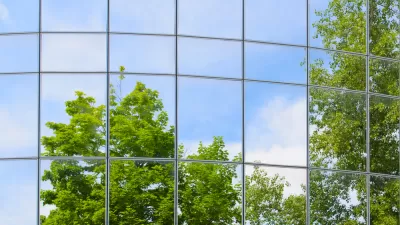The Living Building Challenge is a new environmental rating system that focuses on required environmental design elements, diverging dramatically from the credit-based approach of the built environment's dominant rating system, LEED.
This piece from Metropolis describes the Living Building Challenge as "a rating system from the Cascadia Region Green Building Council, whose 16 design imperatives (not options) makes the U.S. Green Building Council's LEED credits look like something drawn up by Exxon. The Center for Sustainable Living is on track to be one of the country's first Living Buildings, along with an ecology facility at Missouri's Washington University. (Both opened in May, but they have to operate for a year before earning certification.)
Think of the Living Building Challenge as a Port Huron Statement for the green age. Its motto, 'No credits, just prerequisites,' rebukes the moderate incrementalism of LEED, which favors plaques and incentives over soup-to-nuts sustainability."
With about 60 buildings already involved in the system, its creators are hoping that their different approach will inspire the U.S. Green Building Council to update its LEED rating methodology.
FULL STORY: Radical Green

Maui's Vacation Rental Debate Turns Ugly
Verbal attacks, misinformation campaigns and fistfights plague a high-stakes debate to convert thousands of vacation rentals into long-term housing.

Planetizen Federal Action Tracker
A weekly monitor of how Trump’s orders and actions are impacting planners and planning in America.

Chicago’s Ghost Rails
Just beneath the surface of the modern city lie the remnants of its expansive early 20th-century streetcar system.

Bend, Oregon Zoning Reforms Prioritize Small-Scale Housing
The city altered its zoning code to allow multi-family housing and eliminated parking mandates citywide.

Amtrak Cutting Jobs, Funding to High-Speed Rail
The agency plans to cut 10 percent of its workforce and has confirmed it will not fund new high-speed rail projects.

LA Denies Basic Services to Unhoused Residents
The city has repeatedly failed to respond to requests for trash pickup at encampment sites, and eliminated a program that provided mobile showers and toilets.
Urban Design for Planners 1: Software Tools
This six-course series explores essential urban design concepts using open source software and equips planners with the tools they need to participate fully in the urban design process.
Planning for Universal Design
Learn the tools for implementing Universal Design in planning regulations.
planning NEXT
Appalachian Highlands Housing Partners
Mpact (founded as Rail~Volution)
City of Camden Redevelopment Agency
City of Astoria
City of Portland
City of Laramie



























